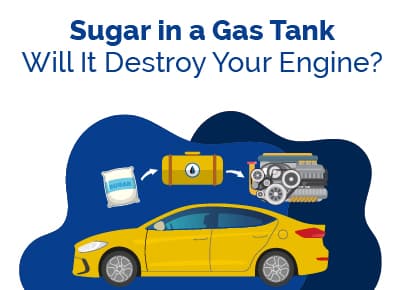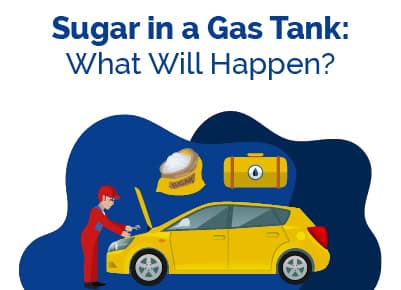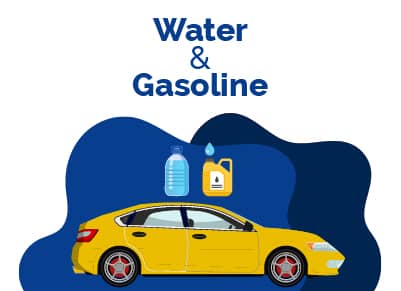Can Sugar In Your Gas Tank Destroy Your Engine?
June 7, 2022


Michael Collado is a car buying expert and has been a professional automotive writer since 2009. He’s written about dealership sales, vehicle reviews and comparisons, and service and maintenance for over 100 national automotive dealerships. Previously, Collado was a copywriter at the ad agency TBWA/Chiat/Day where he worked on brand campaigns for Nissan, ABC Television, Sony PlayStation, and Energizer. His recognition in the ad industry includes awards from Communication Arts and The Clios.
Collado has a Bachelor’s degree from the University of South Florida, with a major in Psychology and a minor in Marketing.
For decades, there has been this common idea that sugar can cause irreparable damage to a gas tank.
However, is this myth true? Also, would this apply to today’s modern engines?
Let's take a look at the effects of sugar in your vehicle's gas tank and see if it will actually destroy your engine.
Table of Contents
What Would Happen If You Pour Sugar Down a Gas Tank?
 The quick answer is no, sugar in a gas tank will NOT destroy the engine. The main reason is that sugar is heavier than gasoline. Therefore, if you were to pour sugar into a gas tank, it would float to the bottom.
The quick answer is no, sugar in a gas tank will NOT destroy the engine. The main reason is that sugar is heavier than gasoline. Therefore, if you were to pour sugar into a gas tank, it would float to the bottom.
Now, let’s say you drive over a bump on the road and some sugar particles get into the fuel line and head towards the engine. Are you headed for disaster? Well, since sugar particles are rather big, they will likely get caught by the fuel filter. However, that doesn’t mean you are completely out of the danger zone. The sugar particles will clog up your fuel filter. This could lead to a stalled engine.
What Happens to the Sugar?
Sugar does not dissolve in gasoline. Therefore, it will pretty much sink to the bottom. This is not deadly for your vehicle. However, you do not want to have foreign contaminants in your vehicle’s gas tank.
According to a recent experience at the University of Berkley, a professor poured sugar into a gas tank to see how much of it would get dissolved in the gasoline. As it turns out, less than a teaspoon of sugar will be dissolved in 15 gallons of gas. The bottom line is that sugar will not play a huge role in your gas tank.
Filters Save the Day
As stated before, the fuel filter will be able to catch any sugar particles that may make it into the fuel line. This is important to make sure that you keep up with the regular maintenance schedule on your fuel filter. It is recommended that you have your fuel filter changed every 15,000 to 30,000 miles.
You will be able to tell if your vehicle needs to have its fuel filter changed if you are experiencing decreasing vehicle performance or stalling.
What Can Destroy Your Engine?
Not that we know that sugar will not destroy your engine, let’s take a look at what could kill your engine.
- Overheating. The most common cause of a destroyed engine is overheating. This is usually the result of a lack of coolant.
- Lack of Oil. If you drive your car without oil, then the moving parts of your engine will have no lubrication and can be destroyed.
- Flooded Engine. If your vehicle is in a flood and gets filled with water, it could destroy the engine.
- Misfiring Engine. If your engine misfires over time, this could destroy important engine parts.
- Worn Engine Parts. Old or worn parts inside of your engine can lead to decreased performance and eventual engine failure.
Water & Gasoline

Now that we know that sugar is not a death sentence for gasoline let’s take a look at the effects of water and fuel. If you have water in your gasoline, this will make it harder for the gasoline to power the vehicle. This could lead to stalling or the inability of the vehicle to start at all.
Naturally, gasoline will have about .5% of water by volume. However, if you have more than this amount of water in your gasoline, you will begin to experience performance issues. Higher concentrations of water in gasoline will lead to major operational issues.
Debunking Sugar in Gas Tank Myth
The bottom line is that sugar is not this instant death sentence for your vehicle. However, you don’t want to start pouring sugar into your vehicle for fun.
If you do encounter any foreign contaminants in your gasoline, then be sure to change out the fuel filter more often. This will help remove these particles from entering your vehicle’s engine.
Best Car Deals by Category
Frequently Asked Questions
How much sugar in a gas tank will damage my car?
This will depend on how much sugar ends up in the fuel line. If you have an extensive amount of sugar in the fuel line, it will begin to clog up the fuel filter. If the fuel filter becomes too dirty, then it will lead to decreased performance, increasing fuel consumption. A completely clogged fuel filter can lead to a stalled vehicle.
Is it a crime to put sugar in someone’s gas tank?
It is a crime to put anything in a person’s gas tank without their permission. That is because a person’s vehicle is considered private property. Therefore any damage to the vehicle can lead to criminal prosecution.
How do I know if there is sugar in my gas tank?
The first thing that you should look for is any signs of your vehicle consuming more fuel or not accelerating as it should. To confirm whether or not you have sugar in your fuel tank, be sure to inspect the fuel filter. You should be able to find sugar particles trapped in the filter.
Can you drive a car with sugar in a gas tank?
While sugar will not instantly destroy your vehicle, it is not recommended that you drive your vehicle if you know for sure that it has sugar in the tank. If you suspect that you have sugar in your fuel tank, then take it to a service center to have the fuel tank drained. Also, have the fuel filter changed at that time as well.
Posted in Car Troubleshooting |




